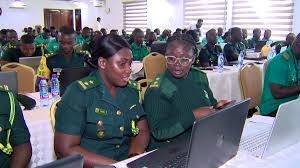When Numbers Start Making Sense: What 90 Immigration Officers in Kumasi Just Did
A few years ago, I was in a visa interview room — sweaty palms, heart racing, and trying not to forget a single detail. The immigration officer across the desk looked calm, but I could tell they were juggling a dozen mental checklists. Ever since that moment, I’ve had a weird respect for what those folks do. It’s not just stamps and forms. It’s people’s lives, journeys, and sometimes even dreams packed into paperwork and data.
So when I heard that 90 immigration officers in Kumasi just went through statistical literacy training, I had a bit of a moment. Not the “oh-cool-some-numbers†moment. More like — finally, someone’s giving them the tools they actually need.
Because let’s be real: in today’s world, being good with numbers isn’t just for data analysts or math nerds. It’s survival. It’s knowing how to spot a trend before it becomes a crisis. It’s being able to say, “Hey, we’re seeing a spike in applications from this region — maybe we need to prepare differently.â€
From what I gathered, this training wasn’t just a boring classroom thing with charts and dry PowerPoint slides (thankfully). It was hands-on, real-world stuff. Officers were learning how to interpret data, how to question the patterns, and — this is big — how not to be misled by flashy-looking stats that don’t actually mean much. You know the ones. Like when a social media post goes viral for showing a 200% increase in something... but the original number was like, two.
Anyway, I love that this happened in Kumasi. There’s something poetic about it. A city that blends old traditions with new energy, now becoming a hub for smarter, more data-savvy governance? That’s a story I’d read twice.
Now, I’m not saying every immigration decision should be reduced to a spreadsheet — that’d be terrifying. People are messy and unique, and stats don’t always tell the full story. But I’ve noticed that when people understand the numbers behind their work, they move differently. More confidently. More thoughtfully.
I don’t know, maybe I’m being too optimistic. But I like to imagine one of those 90 officers sitting at their desk next week, sipping their morning coffee (or Milo, let’s be honest), pulling up a report, and actually getting it. Like really getting it. Not just checking a box, but making a call that could change someone’s life — because the data made it clear.
So here’s what I’m wondering: what would the world look like if every public servant, from immigration to health to education, had the tools to make sense of the numbers? Would we trust systems more? Would we feel a little less lost in the chaos?
Just a thought. But hey — 90 people in Kumasi just took a big step in that direction. Maybe the ripple starts here.



No comments yet
Be the first to share your thoughts!